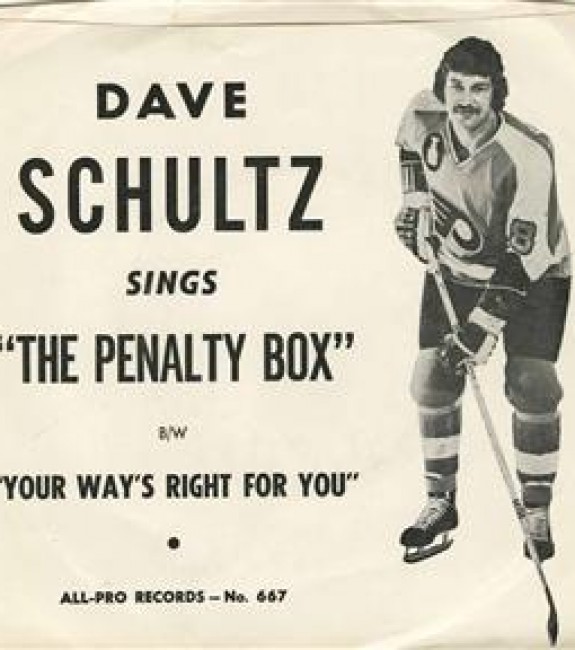Dave “The Hammer” Schultz is known as one of hockey’s greatest enforcers. An NHL veteran of nine seasons with four different teams, the left-winger became a legendary member of the Philadelphia Flyers’ famous band of Stanley Cup-winning tough guys, the Broad Street Bullies. Along with legendary Flyer teammates Bobby Clarke, Bernie Parent, Bill Barber, and Reggie Leach, the left-winger captured two championships in 1974 and 1975. Outside of Philadelphia, hockey fans and insiders from across the league often associate his name with the NHL’s “Schultz Rule,” a policy that banned the use of boxing hand wraps by enforcers for protection during fights.
Related: Bobby Clarke: The Ultimate Philadelphia Flyer
Born and raised in the Canadian province of Saskatchewan, the forward was considered an important offensive contributor during his time in the juniors. During the 1967-68 season, he had 69 points (35 goals and 34 assists) for the Swift Current Broncos of the Western Canada Hockey League (WCHL).
American Hockey League (AHL)
Drafted by the Flyers 52nd overall in the 1969 NHL Amateur Draft, Schultz, along with future Flyers’ teammates Don Saleski and Bob “The Hound” Kelly, were part of Philadelphia’s two-year draft strategy to add bigger and tougher players to their lineup. This strategy was in large part inspired by longtime owner Ed Snider and members of the Flyers’ coaching staff and front office in response to the team being knocked out of the playoffs two years in a row during the 1967-68 and 1968-69 campaigns by the stronger and more physical St. Louis Blues squad.
During the 1969-70 and 1970-71 seasons, Schultz appeared in a total of 79 games for the Flyers’ American Hockey League (AHL) affiliate, the Quebec Aces. During the 1970-71 season, the left-winger made an impact on the AHL as an enforcer, recording 382 penalty minutes in 71 games. The following season, after the Aces relocated to Richmond and became the Robins, Schultz beat his penalty minutes personal best from the previous season, recording 392 in 76 games. He also broke into the NHL that season, playing in one game for the Robins’ parent club, the Flyers.
Philadelphia Flyers
The 1972-73 season marked Schultz’s first full season in the NHL with the Flyers. In 76 games with Philadelphia that season, he recorded 21 points (nine goals and 12 assists) and 259 penalty minutes. Schultz also appeared in 11 playoff games, recording one goal and 51 penalty minutes. After defeating the Minnesota North Stars in the quarterfinals (4-2), the Flyers were eliminated from the playoffs that season by the Montreal Canadiens in the semifinals (4-1).

Over the next two seasons, Schultz was an important contributor to the Flyers’ two Stanley Cup championship runs. During the 1973-74 season, his offensive skills were on display as he scored 20 goals and tallied 16 assists, in addition to the 348 penalty minutes he recorded in 73 games. During the postseason, he added another 139 penalty minutes to his season totals. The enforcer had six points (two goals and four assists) during the Stanley Cup run, including a critical series-winning goal in overtime of game four of the first round against the Atlanta Flames. In the Stanley Cup Final, the Flyers disposed of the favored Boston Bruins in six games (4-2).
The following season, Schultz achieved his career high in penalty minutes, notching 472 in 76 games. That season’s total still holds the record for most penalty minutes in a single season. During the playoffs, he added another 83 minutes in 17 games. The forward also had five points, two goals and three assists, on the way to the Flyers’ victory over the Buffalo Sabres (4-2) in the 1975 Stanley Cup Final.
Schultz’s popularity in Philadelphia was not just achieved on the ice. In 1975, he released a 7-inch double-sided record called, “The Penalty Box.” The Broad Street Bully handled the singing duties on the record, with notable music industry men Vince Montana composing the music and Kal Mann writing the lyrics. Schultz’s first and only attempt at a music career was met with much positive reception as the title track became a Philadelphia region hit.
Los Angeles Kings
On Sep. 29, 1976, Schultz was traded to the Los Angeles Kings for a fourth-round draft pick in the 1977 NHL Amateur Draft and a second-round pick in the 1978 Draft. During parts of two seasons with the Kings, he assumed the role of enforcer, recording 259 penalty minutes. His offensive presence was felt on the ice during the 1976-77 campaign when he scored 10 goals and tallied 20 assists.
Pittsburgh Penguins
On Nov. 2, 1977, Schultz was dealt to the Pittsburgh Penguins with Gene Carr and a fourth-round pick in the 1978 NHL Amateur Draft for forwards Syl Apps Jr. and Hartland Monahan. During the 1977-78 season, he recorded the second most penalty minutes of his NHL career, 378, in 66 games. He also tallied 25 assists that season, the most Schultz recorded during his NHL career.
Buffalo Sabres
On Feb. 6, 1979, the Buffalo Sabres acquired Schultz from the Penguins for left-winger Gary McAdam. The 29-year-old was brought into yet another club to add muscle to the lineup. Despite limited appearances in the NHL over the next two seasons due to injuries and declining quality of play, he strived to make his time on the ice count. During the 1978-79 campaign, he recorded 86 penalty minutes in 26 games. The following season, as the end of his professional career loomed, Schultz spent most of the 1979-80 campaign with the Sabres’ AHL affiliate, the Rochester Americans.
Post-Playing Career
Schultz retired from professional hockey following the 1979-80 season. In 1981, he added published author to this resume when his book, The Hammer: Confessions of a Hockey Enforcer (with Stan Fischler), was released. The book explores the life of the Flyers’ legend and provides insight into what it means to assume the role of an NHL enforcer.

Between 1985 and 2005, he served as a head coach with five different minor league clubs in the Atlantic Coast Hockey League (ACHL), Colonial Hockey League (CoHL), ECHL, and United Hockey League (UHL). In 2022, the former “goon” got a taste of Hollywood when he voiced the animated version of himself in The Simpsons episode, “Top Goon.” During the episode, schoolyard bully Nelson Muntz is trained by Schultz, and fellow notable NHL enforcers Stu Grimson and Tiger Williams, to protect his hockey club’s top goal scorer, Bart Simpson, at the Top Goon Academy.
Honors and Legacy
One of the most popular Flyers to hit the ice, Schultz was the sole inductee into the Philadelphia Flyers Hall of Fame on Nov. 16, 2009. The “lead enforcer” of the Broad Street Bullies is considered by many sources close to the Flyers to be one of the greatest players in franchise history. A 2022 article naming the top 50 Flyers in franchise history placed him at number 29 overall (from “Ranking the Flyers’ 50 greatest players of all time,” Philadelphia Inquirer, Sep. 21, 2022). A fan-favorite who makes regular appearances at Flyers Alumni Association events, the tough left-winger’s role in helping to bring two Stanley Cups to Philadelphia have solidified his acclaimed place in the annals of Flyers’ history.
